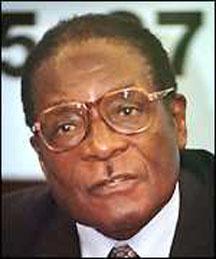HARARE (Reuters) – Former United Nations chief Kofi Annan offered Zimbabwean President Robert Mugabe a deal to step down and live in a safe haven, but the veteran leader rejected the offer, according to US documents obtained by WikiLeaks.

A confidential document dated September 2000 showed that a source from Prime Minister Morgan Tsvangirai’s MDC party told US officials in Harare the party had been told that Annan, the former UN Secretary General Annan, had made the offer to Mugabe during a UN summit in New York.
The source said the MDC did not know the details of the deal, reported to it by a businessman, but that it likely guaranteed Mugabe a financial package from Libyan President Muammar Gaddafi and a safe haven, the cable showed.
“Kofi Annan, in the recent meeting in New York during the Millennium summit, offered Mugabe a deal to step down,” according to the document.
“The opposition party heard that Mugabe turned down the offer the following day after discussing it with the first lady.”
A spokeswoman for Annan declined to comment.
Mugabe has ruled Zimbabwe since independence in 1980 and although there has been talk of several plans to ease him from office in the last decade, the 86-year-old has rejected the idea, saying he would never live in exile.
According to another confidential US cable published by WikiLeaks dated October 2009, a senior MDC official suggested that the US should contribute to a fund to buy off security service chiefs.
Elton Mangoma, a senior member in the MDC and minister in the unity government, told US officials that the military men were frustrating reform and did not want to leave office fearing that they had not made enough money and could be prosecuted.
“Mangoma asked for consideration of US contribution to a ‘trust fund’ that could be used to negotiate the service chiefs’ retirement. He said he planned to approach the UK and Germany with the same request,” the documents said.
The service chiefs have in the past publicly backed Mugabe during elections, saying they would not acknowledge a leader who had not fought in the independence war, a reference to Tsvangirai.









